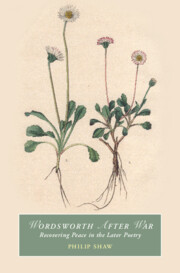90 results
Introduction
-
- Book:
- Wordsworth After War
- Published online:
- 06 July 2023
- Print publication:
- 20 July 2023, pp 1-33
-
- Chapter
- Export citation
Chapter 2 - Peace Out of Time
-
- Book:
- Wordsworth After War
- Published online:
- 06 July 2023
- Print publication:
- 20 July 2023, pp 70-93
-
- Chapter
- Export citation
Select Bibliography
-
- Book:
- Wordsworth After War
- Published online:
- 06 July 2023
- Print publication:
- 20 July 2023, pp 259-271
-
- Chapter
- Export citation
Notes
-
- Book:
- Wordsworth After War
- Published online:
- 06 July 2023
- Print publication:
- 20 July 2023, pp 221-258
-
- Chapter
- Export citation
Copyright page
-
- Book:
- Wordsworth After War
- Published online:
- 06 July 2023
- Print publication:
- 20 July 2023, pp iv-iv
-
- Chapter
- Export citation
Contents
-
- Book:
- Wordsworth After War
- Published online:
- 06 July 2023
- Print publication:
- 20 July 2023, pp v-v
-
- Chapter
- Export citation
Abbreviations
-
- Book:
- Wordsworth After War
- Published online:
- 06 July 2023
- Print publication:
- 20 July 2023, pp ix-x
-
- Chapter
- Export citation
Chapter 1 - Conscripting ‘The Recluse’
-
- Book:
- Wordsworth After War
- Published online:
- 06 July 2023
- Print publication:
- 20 July 2023, pp 34-69
-
- Chapter
- Export citation
After Wordsworth
-
- Book:
- Wordsworth After War
- Published online:
- 06 July 2023
- Print publication:
- 20 July 2023, pp 209-220
-
- Chapter
- Export citation
Chapter 4 - ‘Returning, Like a Ghost Unlaid’
-
- Book:
- Wordsworth After War
- Published online:
- 06 July 2023
- Print publication:
- 20 July 2023, pp 120-144
-
- Chapter
- Export citation
Chapter 5 - Violent Waters
-
- Book:
- Wordsworth After War
- Published online:
- 06 July 2023
- Print publication:
- 20 July 2023, pp 145-173
-
- Chapter
- Export citation
Chapter 6 - Wordsworth after Byron
-
- Book:
- Wordsworth After War
- Published online:
- 06 July 2023
- Print publication:
- 20 July 2023, pp 174-208
-
- Chapter
- Export citation
Index
-
- Book:
- Wordsworth After War
- Published online:
- 06 July 2023
- Print publication:
- 20 July 2023, pp 272-276
-
- Chapter
- Export citation
Acknowledgements
-
- Book:
- Wordsworth After War
- Published online:
- 06 July 2023
- Print publication:
- 20 July 2023, pp vii-viii
-
- Chapter
- Export citation
Chapter 3 - Thanksgiving after War
-
- Book:
- Wordsworth After War
- Published online:
- 06 July 2023
- Print publication:
- 20 July 2023, pp 94-119
-
- Chapter
- Export citation
Figures
-
- Book:
- Wordsworth After War
- Published online:
- 06 July 2023
- Print publication:
- 20 July 2023, pp vi-vi
-
- Chapter
- Export citation

Wordsworth After War
- Recovering Peace in the Later Poetry
-
- Published online:
- 06 July 2023
- Print publication:
- 20 July 2023
16 - Poets and Novelists: Writing the Memory of War
- from Part III - War, Culture and Memory
-
-
- Book:
- The Cambridge History of the Napoleonic Wars
- Published online:
- 05 August 2022
- Print publication:
- 09 June 2022, pp 328-346
-
- Chapter
- Export citation
A daily diary study into the effects on mental health of COVID-19 pandemic-related behaviors
-
- Journal:
- Psychological Medicine / Volume 53 / Issue 2 / January 2023
- Published online by Cambridge University Press:
- 12 July 2021, pp. 524-532
-
- Article
- Export citation
Chapter 7 - Marginal Figures
- from Part II - Subjects and Situations from Common Life
-
-
- Book:
- The Cambridge Companion to 'Lyrical Ballads'
- Published online:
- 08 February 2020
- Print publication:
- 09 January 2020, pp 118-134
-
- Chapter
- Export citation



